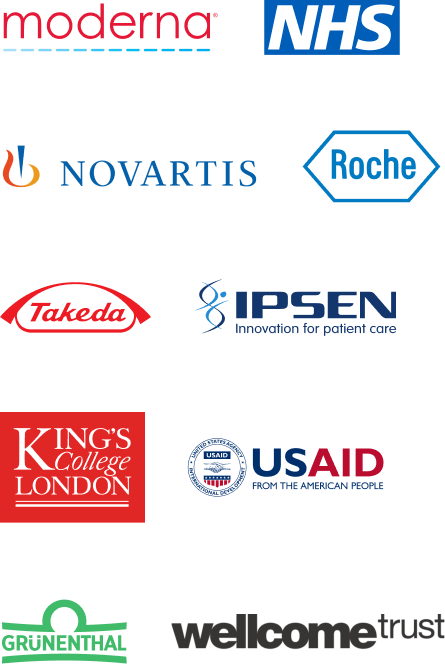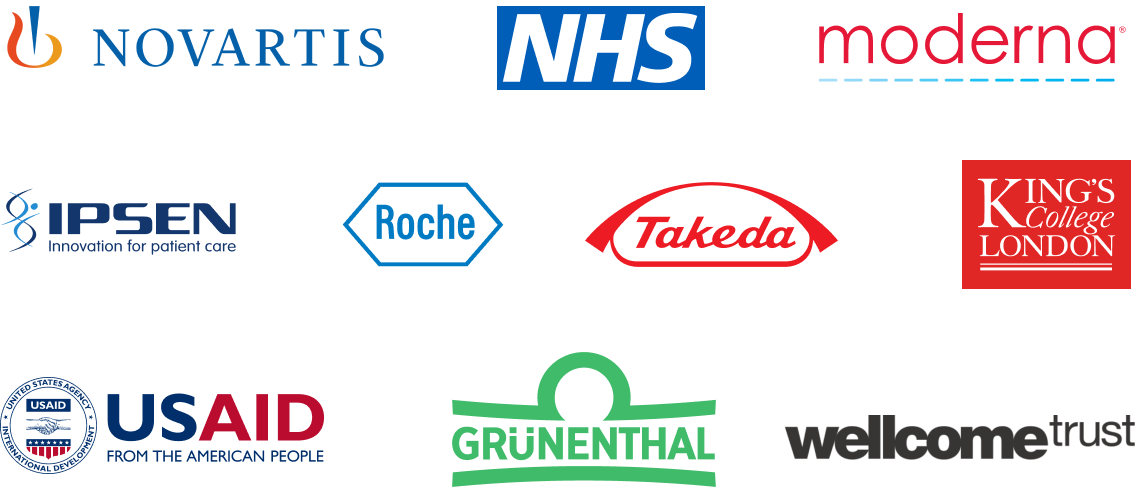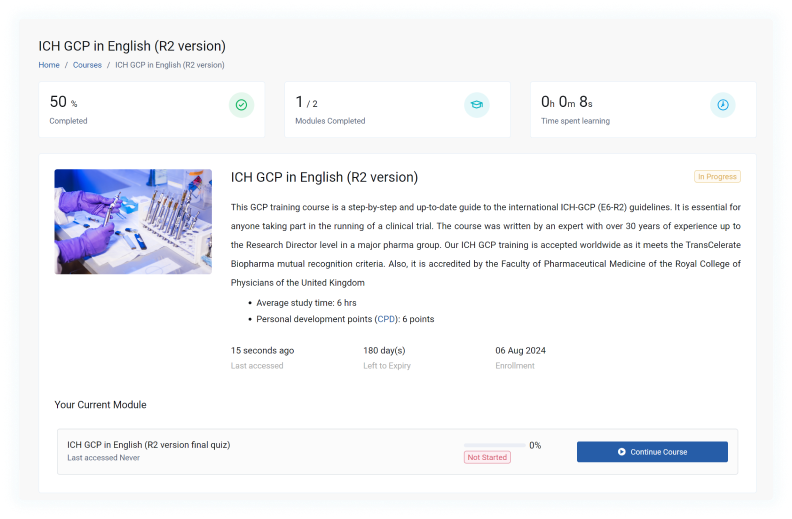Course Syllabus
- Introduction
- What is GCP?
- Why is ICH GCP Important?
- The Principles of ICH GCP
- Additional Learning Points
- Documentation and Version Control
- Quality Assurance (QA)
- Key Resources
- Introduction
- Responsibilities of the CA
- Responsibilities of the IEC
- Subject Informed Consent Forms (ICF): Part 1
- Subject Informed Consent Forms (ICF): Part 2
- Composition, Functions, Operations, Procedures, and Records
- Introduction
- Investigator Responsibilities
- Investigator Qualifications and Agreements
- Adequate Resources
- Medical Care of Trial Subjects: Part 1
- Medical Care of Trial Subjects: Part 2
- Communication with IRB/IEC
- Compliance with the Protocol
- Investigational Medicinal Products
- Randomisation Procedures and Un-blinding
- Informed Consent of Trial Participants
- Informed Consent of Trial Participants: The Consent Discussion
- Informed Consent of Trial Participants: Obtaining Consent Subjects Who Cannot Read or Write
- Informed Consent of Trial Participants: Obtaining Consent of Minors and “Mentally Incompetent” Subjects
- Informed Consent of Trial Participants: Obtaining Consent and Incapacitated Subjects
- Informed Consent of Trial Participants: Updating Consent
- Records and Reports: Introduction
- Records and Reports: Study Site Files
- Records and Reports: Updates & Amendments
- Records and Reports: Source Documents
- Records and Reports: Financial Information
- Records and Reports: The Case Record Form
- Records and Reports: Recording Subject Data
- Premature Termination or Suspension of a Trial
- Progress Reports and Final Reports by Investigator
- Archiving
- Introduction
- Quality Management: Part 1
- Quality Management: Part 2
- QA and QC (Quality Assurance and Quality Control): Part 1
- QA and QC (Quality Assurance and Quality Control): Part 2 – Standard Operating Procedures (SOPs)
- QA and QC (Quality Assurance and Quality Control) – Contracts and Agreements
- Contract Research Organisations: Part 1
- Contract Research Organisations: Part 2
- Trial Design
- Trial Management and Data Processing: Part 1
- Trial Management and Data Processing: Part 2
- Trial Management and Data Processing: Part 3
- Electronic Data Systems
- Record Keeping
- Investigator Selection: Introduction
- Investigator Selection: Permissions
- Investigator Selection: Responsibilities
- Investigator Selection: Compensation
- Financing
- Notification/ Submission to Regulatory Authorities
- Gaining CA Approval in the EU
- Confirmation of Review by IRB/IEC
- Information on Investigational Medicinal Products (IMPs)
- Manufacturing, Packaging, Labelling, and Coding Investigational Products: Part 1
- Manufacturing, Packaging, Labelling, and Coding Investigational Products: Part 2
- Supplying and Handling Investigational Products
- Record Access
- Audit and Inspection
- Noncompliance
- Premature Termination or Suspension of a Trial
- Clinical Trial/Study Reports
- Multicentre Trials
- Introduction
- Monitoring: Part 1
- Monitoring: Part 2 – Monitor Responsibilities
- Monitoring: Part 3 - The Monitoring Visit
- Monitoring: Part 4 – Verification of Investigational Medicinal Products (IMP)
- Complying with the Protocol, Amendments, SOP and Guidance
- Verifying Informed Consent
- The Case Record Form (CRF) and Source Documents
- Verifying Subject Data
- Errors
- Closing out the Monitoring Visit
- The Monitoring Report & Plan
- Quality Management - Centralised Monitoring
- Fraud and Misconduct
- Introduction
- Adverse Drug Reaction Reports: Part 1 – Adverse Events (AEs)
- Adverse Drug Reaction Reports: Part 2 – Serious Adverse Events
- Adverse Drug Reaction Reports: Part 3 – Suspected Unexpected Serious Adverse Reactions (SUSARs)
- Adverse Drug Reaction Reports: Part 4 – Adverse Events of Special Interest
- Adverse Drug Reaction Reports: Part 5 – Periodic Safety Reports
- Adverse Drug Reaction Reports: Part 6 – Reporting Decision Tree
- Introduction
- Protocol Structure and Content
- Introduction
- Investigator Brochure Structure and Content
- Introduction
- Essential Documents
- Archiving
- Documents to be Present Pre-Study
- Documents to be Present During the Study
- Documents to be Present Post-Study
- Glossary & Abbreviations
- Useful Reference Documents List
Our GCP certified customers


Good Clinical Practice (GCP) training is a vital educational programme designed to equip those involved in clinical research with the necessary ethical and scientific knowledge to conduct high-quality trials. This comprehensive course covers the globally acknowledged guidelines set forth by the International Council for Harmonisation (ICH).
The core objectives of GCP training include:
- Safeguarding the rights, safety, and welfare of human participants
- Upholding the accuracy and reliability of clinical trial information
- Fostering uniformly high standards across all facets of clinical research
The Whitehall Training Good Clinical Practice Course thoroughly explores these crucial areas, offering participants a robust understanding of both the theoretical principles and practical implementation of Good Clinical Practice.
For those aiming to engage in clinical trial research, obtaining GCP certification is essential.
If you're keen to broaden your knowledge in this field, a GCP certification offers significant advantages:
- Guarantees adherence to global standards
- Boosts the reliability and calibre of research
- Safeguards the rights and well-being of participants
- Enhances career opportunities within clinical research
The Whitehall Training Good Clinical Practice Course not only provides you with certification but also imparts practical knowledge, enabling you to effectively implement GCP principles in your professional endeavours.
Good Clinical Practice (GCP) certification is crucial for numerous roles within the clinical research field:
- Lead and Assistant Investigators: Those with primary responsibility for overseeing and conducting clinical trials at research locations.
- On-site Trial Team: This includes research assistants, clinical nurses, and other personnel directly involved in managing trial activities.
- Trial Organisers and Research Firms: Individuals responsible for the planning, commencement, and documentation of clinical trials.
- Regulatory Bodies: Officials tasked with ensuring trials comply with established protocols and regulations.
- Ethics Committees and Review Boards: Groups charged with examining and authorising trial methodologies.
- Research Institution Personnel: Staff members ensuring that institutional research adheres to global standards.
- Researchers Funded by National Health Bodies: All staff and investigators participating in clinical trials supported by national health organisations.
Our Whitehall Training Good Clinical Practice Course is designed to accommodate this broad spectrum of professionals, offering both universal GCP principles and role-specific guidance.
The course is also beneficial for individuals seeking to enhance their research capabilities and streamline their clinical trial processes.
Our Good Clinical Practice (GCP) course is designed to thoroughly cover the ICH-GCP (E6-R2) international guidelines, ensuring you meet the necessary training requirements for participation in global clinical trials. We offer this comprehensive training in multiple languages to cater to a diverse audience.
This course serves as a contemporary, step-by-step guide to the ICH-GCP (E6-R2) guidelines, making it an indispensable resource for anyone involved in clinical trial operations. The content has been meticulously crafted by an industry veteran with over three decades of experience, including a stint as Research Director at a leading pharmaceutical company.
We're proud to have received accreditation from the Faculty of Pharmaceutical Medicine of the Royal College of Physicians in the UK, underscoring the quality and relevance of our course material. To accommodate our international learners, we've made the course available in ten languages, including English, German, Bulgarian, French, Italian, Japanese, Polish, Portuguese, Russian and Spanish.
Understanding the importance of regional regulatory frameworks, we've also developed tailored versions of this course for Australia, the UK, the US, France, Germany and Latin America. These localised editions ensure that participants receive training that's directly applicable to their specific regulatory environment.
Our course boasts a user-friendly, visually engaging format that facilitates easy referencing with the ICH-GCP E6 document. Drawing from the author's extensive industry experience, it offers practical insights into the real-world application of GCP principles. As an added benefit, successful completion of the course awards participants 6 CPD points, supporting ongoing professional development in the field of clinical research.
Indeed, our GCP course has received certification from a highly respected body in the field. The Faculty of Pharmaceutical Medicine, which operates under the auspices of the Royal College of Physicians, has granted our course its seal of approval. This organisation has been at the forefront of establishing and maintaining exacting standards for pharmaceutical research since its inception in 1989.
By achieving this certification, we can assure you that our course content aligns with the most current and stringent industry benchmarks. When you complete this course, you'll receive a qualification that is well-regarded throughout the pharmaceutical and clinical research sectors.
The price of GCP certification can vary based on several factors:
- Official recognition: Has the course been endorsed by respected organisations?
- International validity: Does the certification meet ICH standards, allowing participation in global clinical trials?
- Content relevance: Is the material current and authored by industry professionals?
- Duration of availability: For how long can students access the course materials?
Our Good Clinical Practice course at Whitehall Training is priced at £79, reflecting its high value:
- Recognition: We're proud to be accredited by the Royal College of Physicians, offering 6 CPD points.
- Global acceptance: Our certification adheres to ICH E6(R2) guidelines, enabling participation in international clinical trials.
- Expert-led content: The course is crafted by our GCP specialist, Lucy Parker, who brings over 10 years of experience managing research across major institutions like the NHS.
- Lifelong access: We support continuous learning by providing unlimited access to course resources.
Looking to certify a group? We offer a 10% discount when purchasing 5 licences at checkout. For larger team orders, please contact our staff to discuss further savings.
Indeed, there are some GCP courses available without charge, but it's important to be aware of their potential drawbacks:
- The material may be of lesser quality, lacking accreditation and potentially outdated
- These courses typically don't offer an official certificate, which is crucial for those intending to participate in clinical research
That being said, these free options can serve a purpose for individuals seeking a rudimentary grasp of GCP principles and fundamental concepts. They might be suitable for those who simply want to familiarise themselves with the basics of Good Clinical Practice.
However, for professionals requiring comprehensive, accredited training that allows them to actively engage in clinical trials, Whitehall Training's Good Clinical Practice Course offers a more robust and recognised solution. Our course ensures you receive up-to-date, high-quality content along with the necessary certification to conduct clinical research.
Whitehall Training's Good Clinical Practice (GCP) course offers an in-depth exploration of the essential principles and practices required for ethical and scientifically robust clinical trials. Our programme is carefully structured to cater to learners at various levels, featuring both foundational and more advanced content.
The curriculum encompasses a wide range of crucial subjects, including:
- The historical context and core principles of GCP
- Defining the duties of investigators, sponsors, and monitors
- Ethical considerations, with a focus on informed consent procedures
- Developing and adhering to trial protocols
- Managing safety reports and adverse events
- Ensuring data integrity and quality control
- Understanding regulatory requirements and interfacing with authorities
- Maintaining essential documentation and records
- Proper handling of investigational medicinal products
- Best practices in site management and monitoring
Our course utilises a variety of engaging e-learning techniques to enhance the educational experience:
- Comprehensive instructional material
- Authentic case studies and scenarios drawn from real-world situations
- Engaging knowledge assessments and quizzes
- Practical examples that demonstrate best practices
- Opportunities for personal reflection and practical application of learned concepts
This carefully crafted approach ensures that participants gain a thorough understanding of GCP principles, preparing them for the complexities of modern clinical research.
Acquiring your Good Clinical Practice certificate involves a simple two-stage process:
- Work through our engaging, interactive learning materials to complete the educational component of the course.
- Sit the online final assessment.
Feeling apprehensive about the GCP examination? There's no need for concern. The test is merely a necessary step to confirm your readiness for research participation. Should you not succeed on your first attempt, you can easily revisit our comprehensive resource library to address any knowledge gaps, then have another go at the exam.
At Whitehall Training, we've structured our Good Clinical Practice course to ensure participants not only absorb the material but can also effectively implement it in real-world clinical research environments. Our comprehensive assessment approach includes:
-Continuous Learning Checks: As you progress through each module, you'll encounter interactive exercises and scenario-based questions. These serve to cement key concepts and provide immediate feedback on your understanding.
-Comprehensive Final Evaluation: The course concludes with a thorough examination that tests your grasp of GCP principles and their practical application. This evaluation covers all crucial areas explored in the course, such as:
- Ethics in clinical studies
- Adhering to regulatory standards
- Understanding trial team member duties
- Ensuring data accuracy and quality
- Managing safety reports and unexpected events
-Real-world Application: The final evaluation includes questions designed to assess how well you can apply GCP guidelines to lifelike clinical trial situations.
To ensure you're fully equipped to conduct trials, you must successfully complete the final evaluation to receive your GCP certification.
We understand the importance of mastering this material, which is why you can retake the final evaluation as many times as needed. This approach ensures that all participants achieve the necessary proficiency to become GCP qualified.
Our Good Clinical Practice (GCP) course is crafted to suit a diverse array of professionals engaged in clinical research. Whilst a fundamental grasp of clinical research can be advantageous, it's not essential for enrolment. We've meticulously structured the course material to cater to varying levels of expertise and roles within the clinical trial sphere.
This training proves particularly beneficial for:
- Research Coordinators in clinical settings
- Lead Investigators and their supporting team
- Nurses specialising in research
- Professionals overseeing clinical trials
- Specialists in data management and biostatistics
- Individuals working in regulatory affairs
- Experts in quality assurance
- Members serving on ethics committees
- Pharmacists participating in clinical trials
- Personnel from sponsoring organisations and Contract Research Organisations (CROs)
Whether you're taking your first steps in clinical research or seeking to polish and modernise your existing knowledge, our course offers thorough coverage of GCP principles and their real-world application. The content is designed to be informative and accessible, ensuring that learners from various backgrounds can benefit from the training.
Yes, our Good Clinical Practice course is fully web-based, which brings several benefits to our learners:
-Flexible study schedule: You can work through the course content at your own rhythm, allowing you to absorb the information thoroughly without feeling rushed. This approach accommodates various learning preferences and busy timetables.
-Study anywhere: The course materials are available round-the-clock and can be accessed from any internet-enabled device. Whether you're at home, in the office, or on the move, you can continue your learning journey.
This online format ensures that you can fit your GCP training around your other commitments, making it easier to balance your professional development with your daily responsibilities.
The ICH is a worldwide organisation that establishes guidelines for pharmaceutical research and development, with Good Clinical Practice (GCP) being a crucial component. Here are some essential points to understand:
- The ICH unites regulatory bodies and pharmaceutical industry experts.
- It develops globally accepted standards for conducting clinical trials.
- The ICH GCP guidelines are designed to safeguard trial participants and ensure the reliability of data.
- These guidelines undergo regular revisions, with ICH GCP E6(R2) being the most recent iteration.
Compliance with these ICH guidelines is mandatory for anyone involved in clinical trials. This is precisely why we’ve developed our comprehensive Good Clinical Practice course. Our training covers all 13 fundamental ICH GCP principles in depth, equipping you with the knowledge needed to conduct research that meets international standards.
ICH Good Clinical Practice E6 (R2) is the latest iteration of the Good Clinical Practice guidelines, published in 2016 by the International Council for Harmonisation of Technical Requirements for Pharmaceuticals for Human Use (ICH). This update marks a pivotal shift in GCP standards, adapting to the ever-evolving realm of clinical research.
Grasping the essentials of ICH GCP E6 (R2) is vital for all clinical research professionals due to several key factors:
- It sets the benchmark for ethical and scientifically robust clinical trials on a global scale.
- Regulatory bodies across the world often mandate adherence to these guidelines.
- It plays a crucial role in safeguarding human participants and ensuring the integrity of trial data.
- Numerous sponsors and research institutions expect their teams and collaborators to be well-versed in and compliant with these updated guidelines.
The Whitehall Training Good Clinical Practice Course offers comprehensive coverage of ICH GCP E6 (R2). Our programme ensures that learners gain a thorough understanding of these revised guidelines and can implement them effectively in their clinical research endeavours.
The International Council for Harmonisation (ICH) Good Clinical Practice (GCP) guidelines are underpinned by 13 essential principles that establish the ethical and scientific standards for conducting clinical research. These key principles encompass:
- Upholding ethical standards
- Ensuring benefits surpass potential risks
- Safeguarding participants' rights and well-being
- Providing comprehensive supporting evidence
- Implementing scientifically robust protocols
- Obtaining approval from ethics committees
- Ensuring qualified medical oversight
- Employing competent investigators
- Acquiring informed consent
- Maintaining precise data documentation and reporting
- Preserving confidentiality
- Adhering to good manufacturing practices for investigational products
- Implementing quality assurance systems
The Whitehall Training Good Clinical Practice Course offers comprehensive instruction on these principles, equipping you with the knowledge to effectively apply them in practical clinical research scenarios. By delving into each principle in detail, our course ensures you gain a thorough understanding of their significance and implementation in real-world settings.

